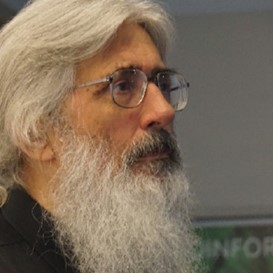Submitted by Lottie Groocock on Fri, 25/10/2024 - 10:52
David P Judge
1948-2024
David Judge was a computer scientist who pioneered Bioinformatics training in the University and more widely. In 1986 he started the University of Cambridge Bioinformatics Training Facility in the Department of Genetics and virtually single handedly developed and ran it until his retirement in 2015. After a degree in Computer Science from Essex University, David variously worked as a software engineer or computer operator until he developed an interest in teaching. He undertook teacher training at the end of the 1970’s and for the first half of the 1980’s worked as a lecturer at a Further Education College, teaching Computer Science and some Mathematics. He came to Cambridge in 1986, initially to develop computer-aided teaching resources, but quickly became attracted by then emerging discipline of bioinformatics. Beginning with a primary focus on DNA sequence analysis using the Staden and then the GCG suite of tools, housed in a somewhat dilapidated attic room in the Department of Genetics with a handful of workstations, David soon developed an international reputation for the quality of his hands-on training courses.
Countless undergraduate and postgraduate students, alongside more seasoned research scientists, benefited from his training. As bioinformatics expanded beyond DNA sequence analysis, he grew the facility, recruiting expertise from far and wide to deliver up to date training in the latest analysis methods and computational tools. Equally importantly, he provided an environment where computational biologists could develop their teaching skills, an increasingly important function as bioinformatics developed. He grew the facility from its humble beginnings to a 50-seat teaching room with excellent computing and digital AV capacity. David was in much demand as a bioinformatics educator, in Cambridge he worked with the Sanger Institute and EMBL-EBI, and in 1989 he started delivering training for the Instituto Gulbenkian de Ciência in Oeiras Portugal and contributed regularly to the Gulbenkian Training Programme in Bioinformatics since its formation in 1999.
He was a longstanding contributor to the ICGEB programme in Trieste, to the Malaysia Genome institute in Kuala Lumpur, and many others. After he retired from Cambridge he continued to travel to deliver training, not only his long-standing work in Portugal and other parts of Europe, but much more widely. In the Sudan, South Africa and other parts of the continent he made significant long-term contributions to H3ABioNet, a Pan African Bioinformatics Network for the Human Heredity and Health in Africa consortium, that provided accessible training for many students. He contributed to training in Asia (China, India, Sri Lanka and Thailand), The Americas (Brazil, Mexico, USA) and others. A reminder of his international impact was the way he festooned the training room in the Genetics Department with mementos and nick-nacks both from his travels and gleefully brought by enthusiastic visitors, the cheesier the better seemed to be the rule of the day.
David was a true pioneer, his dedication coupled with his dry humour made the teaching and learning of bioinformatics a real pleasure. He will be sadly missed but will have the gratitude of a multitude of scientists and clinicians who graced his training room.

